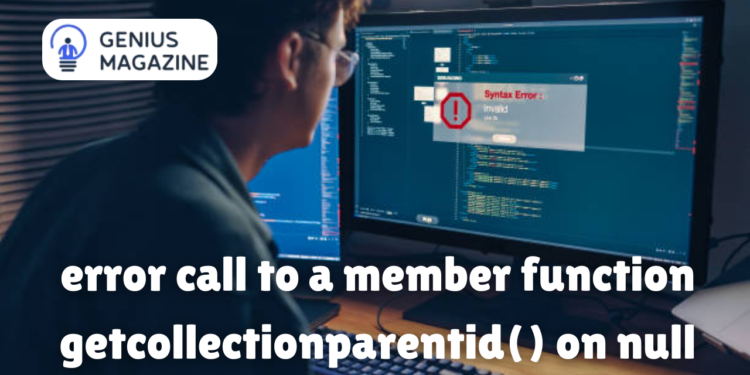When programming, encountering an error can often disrupt workflow and cause frustration. One such error, “error call to a member function getCollectionParentId() on null”, can leave even experienced developers perplexed. In this article, we will explore the nature of this error, its common causes, and provide actionable solutions to help you resolve it effectively.
Understanding the Error
This error occurs when a program tries to invoke a method called getCollectionParentId() on an object that has not been properly instantiated. In simpler terms, the program is trying to access functionality from an object that does not exist at the moment of execution.
Key Components of the Error:
- Member Function: The
getCollectionParentId()method belongs to a specific object, and the program expects it to perform a defined task. - Null Object: The object on which the method is being called is
null, meaning it has not been initialized or is absent.
Causes of the Error
The primary reasons for this error include:
Object Not Initialized
The object in question is either not created or not assigned a value. For example:
$myObject = null;
$parentId = $myObject->getCollectionParentId(); // This will trigger the errorUnexpected Null Return
The object might be expected to exist but is null due to a failed operation or missing data, such as when fetching from a database.
Logical Issues
Faulty logic in your code could unintentionally set the object to null or bypass initialization steps.
Broken Object References
If the object is passed between functions or classes and altered or unset along the way, it may lose its intended value.
How to Troubleshoot
Resolving this error requires identifying the root cause. Here are practical steps to help debug and fix it:
Verify Object Initialization
Ensure that the object is correctly initialized before the method call:
class MyClass {
public $parent_id;
public function getCollectionParentId() {
return $this->parent_id;
}
}
$myObject = new MyClass();
$myObject->parent_id = 123; // Proper initialization
$parentId = $myObject->getCollectionParentId(); // Successful method callDebug the Code
Use debugging tools to step through your code line by line. Pay close attention to the variable’s state before the method call.
Add Conditional Checks
Introduce a safeguard to check if the object is null before invoking the method:
if ($myObject !== null) {
$parentId = $myObject->getCollectionParentId();
} else {
echo "Object is null";
}Examine Data Sources
If the object is fetched from a database or API, confirm that the data source is correctly providing the expected results. For example:
$myObject = fetchObjectFromDatabase($id);
if ($myObject === null) {
echo "Object not found";
}Preventive Measures
Always Initialize Objects
Avoid leaving objects uninitialized. Use constructors to assign default values:
class MyClass {
public $parent_id;
public function __construct($parent_id = null) {
$this->parent_id = $parent_id;
}
}Implement Error Handling
Use exception handling to catch and manage errors gracefully:
try {
$parentId = $myObject->getCollectionParentId();
} catch (Error $e) {
echo "Caught error: " . $e->getMessage();
}Validate Inputs and Outputs
Ensure the integrity of data being passed around in your program. Regularly validate that objects are not null where they shouldn’t be.
Common Scenarios and Fixes
Null from a Database Query
A database query may return null when the record does not exist:
$myObject = $database->findObjectById($id);
if ($myObject === null) {
echo "No record found for ID $id";
}Dependency Injection Issue
If using dependency injection, ensure that the dependencies are correctly provided to your class:
class MyService {
private $repository;
public function __construct($repository) {
$this->repository = $repository;
}
public function getParentId() {
$object = $this->repository->fetchObject();
if ($object === null) {
throw new Exception("Object is null");
}
return $object->getCollectionParentId();
}
}Also Read : healthtdy.xyz: A Comprehensive Review
Conclusion
The “error call to a member function getCollectionParentId() on null” is a common yet solvable issue in programming. By understanding its causes and implementing robust debugging and preventive techniques, you can tackle this error efficiently. Always ensure that objects are properly initialized, and introduce checks and balances in your code to handle unexpected null values gracefully. This approach not only resolves the issue but also strengthens the overall reliability of your application.































